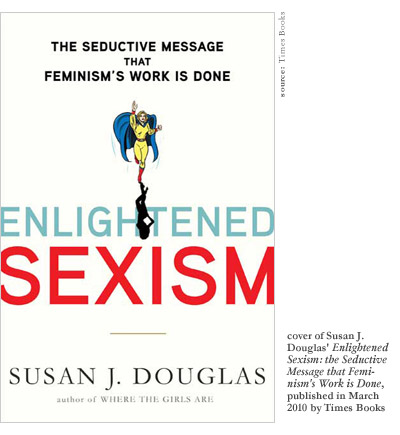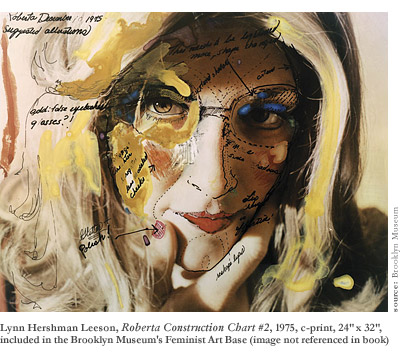For over four years, I have asked my college writing and literature students whether or not they consider themselves feminist. The results are fairly monochromatic. Most say no in various gradations. A few will thoughtfully admit that sexism still exists, but that discussions of feminism are rare. The vast majority look discomfited and baffled discussing feminism—the new “f-word.” During one discussion, a student mentioned a group on the ubiquitous social networking site Facebook called “Why Do Girls Go to College? You Don’t Need a Degree to Make a Sandwich.” The group counts more than 8,000 fans, and includes photos and drawings of women being mocked or humiliated. Perhaps the most disturbing image is a 1950s-style black and white photo of a woman being slapped across the face by a man, with the title “Slap a bitch: because you too can own this look of satisfaction.” The page is filled with approving, amused comments by female and male users alike. Good-natured fun, or sinister reflection of a new anti-feminism?

Susan J. Douglas’ new book Enlightened Sexism: the Seductive Message that Feminism’s Work is Done, published by Times Books this past March, focuses on the current uneasiness about feminism combined with humorous degradation of women. The term “enlightened sexism” describes the insidious embrace of retro-sexism lurking beneath the surface of the celebration of feminism’s advances of the last 40 years. Twenty-first Century feminism seems a vague, embarrassing topic, much less a movement. Today’s pervasive attitude of enlightened sexism declares feminism successful and accomplished. Douglas writes: “If there is no more sexism, then there is no longer a need for sexual politics, and sexual politics can be mocked and attacked…It’s silly to be sexist; therefore, it’s funny to be sexist.” Hence the supposed hilarity of questioning why girls go to college.
Douglas’ well-researched book is an important voice in a necessary conversation: is feminism dead? Accomplished, therefore pointless? Her argument that feminism has been co-opted by enlightened sexism is ambitious and the book is an interesting, witty look at how American pop culture and media have shaped women’s self-identification. Tackling television, films, music (particularly rap), glossy magazines, media, and politics, she exposes American cultural attitudes toward women generally, and feminism specifically.
Enlightened sexism emphasizes physical attractiveness and consumerism to achieve it. This is the new empowerment—a false sense of girl power created in media images. Feminism is “something young women should shun as old-fashioned, withered, humorless, repulsive…it is no longer needed, ‘a spent force.'” The book begins and ends with Douglas imagining an American culture that has transcended the incessant need to push feminism further and further back to avoid its resurgence. She traces the roots of today’s consumerist excesses and dumbed-down refusal to critically think about gender inequalities back to the 1990s. She cites the savvy, feminist young women’s magazine Sassy and the Riot Grrrl movement as examples of a growing dissatisfaction among young women being force-fed Beverly Hills, 90210 and a steady media diet “telling girls they had to be makeup-obsessed, boy-centered, marriage-aspiring airheads.”
And there was “plenty for women to be enraged about in the early 1990s,” including the Clarence Thomas-Anita Hill hearings and the Tailhook scandal. Douglas argues that since then, the media have collectively shifted toward an emphasis on sexuality and consumerism, “a response, deliberate or not, to the perceived threat of a new gender regime.” But in the wake of 1992 being dubbed by the press the “Year of the Woman,” a more sublimated backlash was necessary than overt chauvinism, one that inserted itself into media, culture, and politics.
Douglas takes the media and culture to task for an insidious insistence “that women have made plenty of progress because of feminism…so now it’s okay, even amusing, to resurrect sexist stereotypes of girls and women.” Entertainment journalism is just one of the ways these sexist stereotypes survive and flourish. Celebrity magazines scrutinize females for their good girl / bad girl behavior, material possessions, and beauty. A schadenfreude-happy media and public alternately vilify and glorify them, with the eventual result that women turn that relentless scrutiny of celebrities onto themselves.
One of the book’s more powerful sections examines popular magazines. Douglas carefully deconstructs the mixed messages in women’s beauty magazines like Cosmopolitan and Glamour, with their relentless pressure to conform to standards of beauty. They offer wildly contradictory advice, from girl power dictums to being a “superhottie” sexpert to “not being remotely threatening to men.” When observing men’s magazines, Douglas exposes the use of irony as a deflective shield in debasing women, such as in the approach of Maxim. She writes, “…sexism is stupid and retro, so why would they be sexist? Only some clueless old maid who only looks at the covers and doesn’t get the jokes would think that.” This ironic, jokey veneer “gives enlightened sexism…a protected perch.”

When Douglas focuses on television, she exposes reality TV for its similar viewer-in-on-the-joke approach, representing either/or falsehoods about women—they are either portrayed as the one-dimensional bitch or the nice girl. (Think The Bachelor or The Real World.) Douglas wakes us from our TV-induced coma with a “top ten list of enlightened sexism in action, under the pretense of simply depicting ‘reality’.” She also reexamines the consumerist American icon Oprah Winfrey as an entity that “affirms—indeed, demands—that women turn within and improve themselves instead of turning outward and storming the barricades.” Employing a fresh approach with eye-opening statistics, Douglas shines light on the underbelly of American pop culture.
But for all the book’s witty scrutiny of pop culture and a truly astute analysis of feminism’s “complicated and contradictory terrain of negotiation,” Douglas tends, particularly in the book’s first half as she charts the fall of active feminism in the 1990s, toward facile, overdrawn observations that crack under a closer look. For example, she juxtaposes former U.S. Attorney General Janet Reno’s accomplishments and high approval ratings (even referring to her as a “national folk hero”) with the attention Reno’s looks attracted, especially in the comedy arena and the news media. Douglas concludes that Reno’s “sins were multiple: she was androgynous and didn’t care about sexual display.” Jokes about Reno weren’t political, but rather reflected “deeply uneasy, nervous outbursts” against a woman with a decided lack of femininity. It’s difficult to reconcile this image of Reno as both national folk hero and threatening at the same time. A more nuanced analysis would address America’s long history of mean-spirited satire aimed at those in power, including President “Bubba” Clinton’s love of cheeseburgers and sometimes portly appearance. Douglas cites Will Ferrell’s impersonation of Janet Reno on Saturday Night Live, but fails to mention Reno’s poking fun at her own image, appearing alongside Ferrell on one episode.
The book could benefit from a more comprehensive discussion. Douglas draws out examples of TV shows and music from days gone by, but makes no mention of Eve Ensler’s work, which would add considerably to this conversation. Similarly, there is a brief reference or two to Nancy Pelosi, criticizing Chris Matthews for asking a guest if Pelosi was going to “castrate” then House Majority Leader Steny Hoyer. But a more effective discussion would include why even female commentators routinely assess U.S. House Speaker Pelosi’s physical appearance rather than her performance (notably Laura Ingraham). Judging women based on their perceived attractiveness is exactly the sort of enlightened sexism Douglas is confronting. And lest you think that this book is merely an academic exercise in “-isms,” note the Washington Post‘s recent coverage of California Republican Senate candidate Carly Fiorina’s unapologetically demeaning comments about rival Barbara Boxer’s hair. In his column “Fiorina Pulls Boxer’s Hair—Rhetorically Speaking,” Jonathan Capehart describes Fiorina as “stylish” and Boxer as “not-so-stylish” in discussing Fiorina’s comments that Boxer’s hair was “so yesterday.”
Douglas expands her analysis beyond pop culture, criticizing the U.S. government for its abysmal infant mortality rates, pay equity, and “worst public policies of any industrialized nation to support mothers and families.” She blames former President George W. Bush and his administration for undermining women’s rights—”they just did not give a rat’s ass…we—especially girls and women—were utterly irrelevant.” But the book is blatantly partisan in distracting ways, as she ridicules Sarah Palin as an “ignoramus” and ignores Laura Bush’s work on behalf of women, reducing her to a “stay-at-home mom who organizes her cleaning products via the Dewey decimal system.”
Despite the book’s occasional overreach, the merit of Enlightened Sexism outweighs its weaknesses. Douglas invites you to argue with her, and any discourse about the covered-over topic of retreating feminism is relevant. Her irreverent style is finely balanced with an intellectual, earnest case for reexamining the signifiers of America’s media, political landscape, and culture.
Douglas’ inclusive message is that “most women…just want to be side-by-side: with their sisters, their friends, their daughters, and yes, believe it or not, with their men.” She encourages a new movement to embrace feminism because “in our heart of hearts, we do miss feminism: its zeal, its audacity, its righteous justice. So let’s have some fun, and get to work.”
And although Susan J. Douglas does not address Facebook in Enlightened Sexism, she concludes with a reference to a Web site that might just make the Facebook group “Why Do Girls Go to College?” obsolete—feministing.com, which proclaims that “the smartest, coolest girls I know are feminists.” After reading this crucial and intelligent book, you may never look at American popular culture and contemporary ideas of gender identity the same way again.
